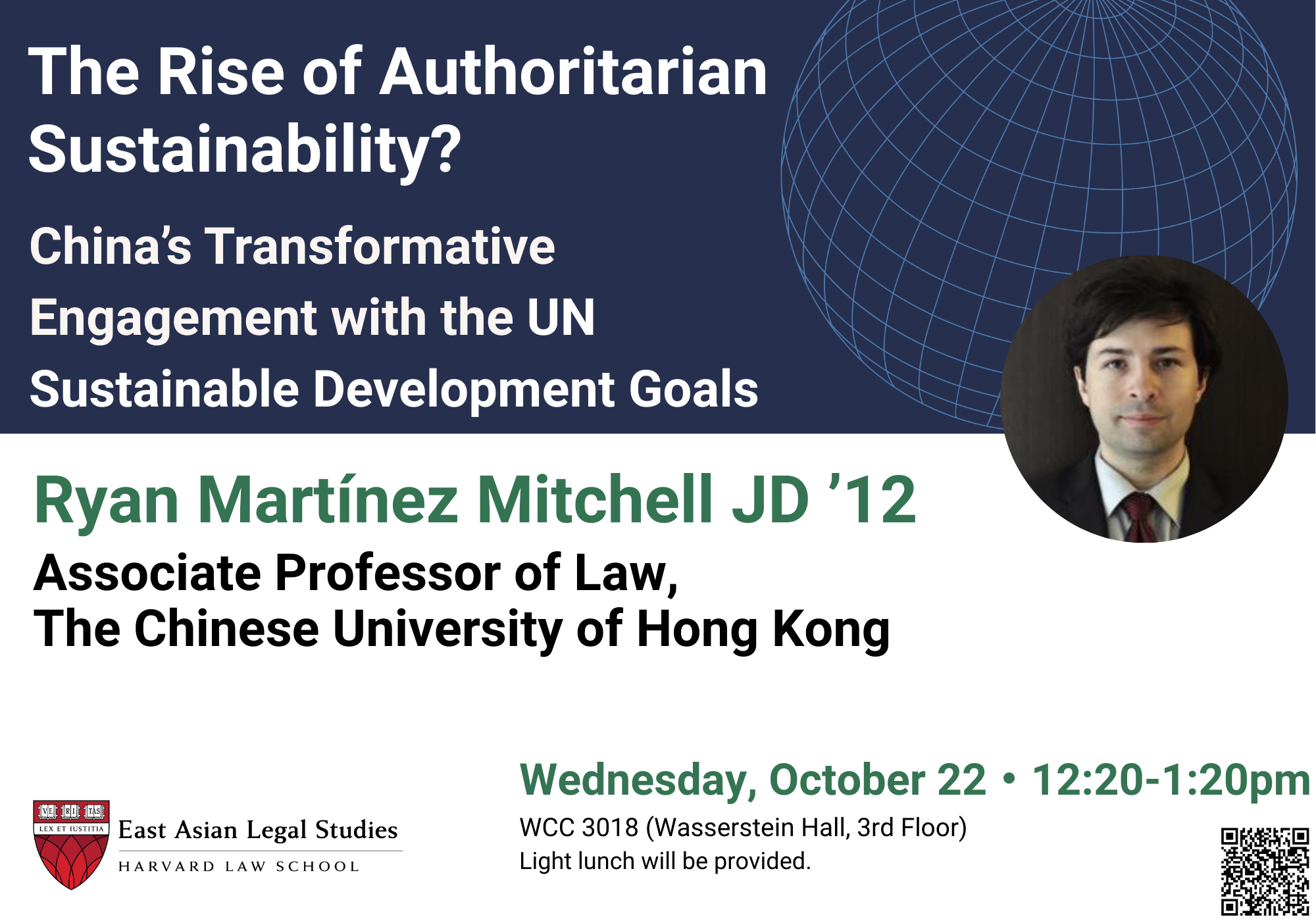The Rise of Authoritarian Sustainability? China’s Transformative Engagement with the UN Sustainable Development Goals
October 22, 2025
12:20 pm - 1:20 pm
This event has passed
WCC 3018

Ryan Martinez Mitchell, JD ’12
Associate Professor of Law, The Chinese University of Hong Kong
Author of Recentering the World: China and the Transformation of International Law
Since the adoption of the UN’s Sustainable Development Goals (SDGs) in 2015, this global development concept has been increasingly incorporated into the People’s Republic of China’s structures of state planning, intra-Party governance, and a comprehensive ideological narrative articulating both national and global objectives. Indeed, China’s role in and advocacy for the SDGs, beginning during the negotiations on their formation, is now at the heart of its foreign policy and international law initiatives. There has also been an increasing permeation of SDG indicators into Beijing’s domestic formulation and evaluation of policies (including for audiences of elite policymakers). Significantly, China has also come to be seen by many as a model of achievement with regard to the SDGs at a time of US withdrawal and generalized crisis in the arena of global development.
The emerging pattern could be seen as one example of “authoritarian sustainability”: a configuration in which the legitimacy of illiberal governance is extensively reinforced by the discourse and metrics of sustainable development. As a unique melding of China’s domestic politics with a global agenda, the SDG targets now serve as guiding principles, integrating social and environmental policy, economic regulation, and state legitimacy claims into a single project. At the same time, viewed in connection with the international legal order, Beijing’s approach may help spur a global transition away from civil and political conceptions of human rights, in favor of the similarly universalist but “post-liberal” SDG framework. However, while in many ways a success story, China’s model of SDG engagement also includes several paradoxical features that may indicate its own replicability challenges, latent drawbacks or contradictions, and the need to contemplate alternative paths. Empirical and structural analysis of China’s legal and regulatory approaches indicate features–such as reliance on controlled disruption, völkisch ecology, and “saltationist” mobilization–that call into question the viability of authoritarian sustainability as a long-term model in China or as an example for developing states.
Ryan Martínez Mitchell is an Associate Professor of Law at the Chinese University of Hong Kong. His work on international and comparative law, legal history, Chinese law, and Asian legal systems has appeared in leading academic journals. His analysis of these issues has also featured in policy-related publications including Foreign Affairs, The National Interest, The Diplomat, and others, and his analysis has been cited in media including The New York Times, The Wall Street Journal, Financial Times, The National Interest, NPR, Bloomberg, Nikkei Asia, Al Jazeera, Foreign Policy, and other major media outlets. His first book, Recentering the World: China and the Transformation of International Law, was published by Cambridge University Press in 2022. Mitchell holds a B.A. with honors from The New School, a J.D. from Harvard Law School, where he was also a Cravath International Fellow and an Irving R. Kaufman Public Interest Fellow, and a Ph.D. in Law with distinction from Yale Law School, where he was an Andrew W. Mellon Foundation Humanities Fellow and obtained Yale’s Archaia qualification in the study of premodern societies. He is a member of the State Bar of California and has experience in international human rights litigation. In the current academic year, he will be a visiting Fellow at Yale Law School’s Orville H. Schell Jr. Center for International Human Rights, Global Faculty at the Freie Universität Berlin Department of Law, and an International Affairs Fellow in Japan for the Council on Foreign Relations.
A light lunch will be provided at this event.
*Location note: In past years, EALS talks were generally in Morgan Courtroom (Austin 308), but due to the construction project currently underway next to Austin Hall, we will hold most EALS talks in Wasserstein Hall during the 2025-2026 academic year.
Please register here.